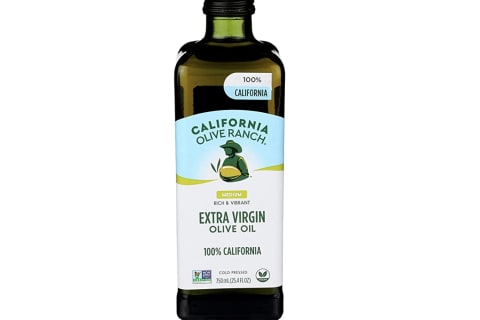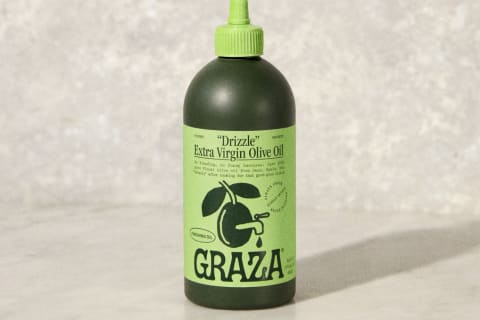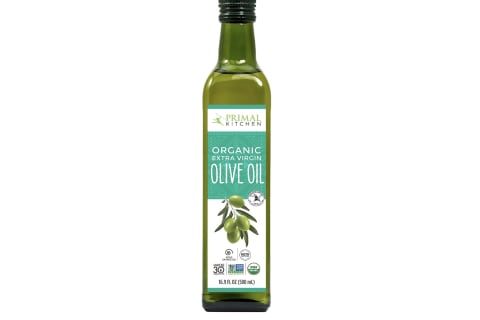Advertisement
The Top 8 Health Benefits Of Olive Oil + How It Compares To Other Oils


When it comes to healthy fats, olive oil is a near-unanimous favorite. Not only is it delicious and versatile, but it’s linked to some pretty impressive health perks. And, unlike most hyped-up foods, olive oil’s benefits are backed by decades of scientific research.
In this article, we take a deep dive into the health benefits of olive oil and get expert advice on sourcing the best one.
Overview of olive oil
Olive oil is a type of fat derived from olives. There are many types of olive oil1, but they’re all made through a process that involves washing, crushing, milling, and pitting olives in order to obtain their oil.
The finished product contains a mix of compounds including fatty acids, polyphenols, and vitamin E, all of which function to promote health.
Olive oil is a main component of the Mediterranean diet, a term used to describe diets traditionally followed by people living in countries along the coast of the Mediterranean Sea, including Italy, Greece, Spain, North Africa, and parts of the Middle East.
Health benefits of olive oil
Diets rich in olive oil have been shown to promote health in a number of ways. Plus, studies have identified special compounds in olive oil that have powerful protective effects in the body. Here are a few of the most compelling science-backed health benefits of olive oil.
It can protect against atherosclerosis.
Olive oil contains anti-inflammatory and antioxidant compounds like polyphenols, which help protect against atherosclerosis—the buildup of plaque in the arteries.
Olive oil compounds help reduce oxidative stress, improve blood vessel function, and decrease the production of inflammatory molecules like adhesion molecules2, which play a key role in the development and progression of atherosclerosis.
A 2021 article3 published in Stroke found that people with heart disease who followed an olive oil-rich Mediterranean diet for seven years had decreased atherosclerosis progression compared to those who followed a low-fat diet.
Summary
It may lower your risk of heart disease.
In addition to protecting against plaque buildup in the arteries, diets rich in olive oil have been shown to boost protective HDL cholesterol4 and lower high blood pressure5. This is why olive oil intake has been linked to a lower risk of heart disease.
A 2021 study6 published in The Journal of the American College of Cardiology found that US adults who consumed greater than 7 grams of a ½ tablespoon of olive oil per day had 14% lower risk of heart disease compared to people who didn’t eat olive oil.
Olive oil is mostly composed of monounsaturated fatty acids and is low in saturated fats, so it’s liquid at room temperature. Its high content of unsaturated fats means it’s a good choice for heart health, but remember that it’s your diet as a whole that matters most when it comes to disease prevention.
Summary
It contains powerful anti-inflammatory compounds.
Olive oil contains an array of compounds that help regulate inflammation in the body, including the polyphenols hydroxytyrosol (HT) and hydroxytyrosol acetate (HT-ac).
These compounds work7 by inhibiting inflammatory signaling pathways and reducing the upregulation of inflammatory enzymes like cyclooxygenase-2 (COX-2) and Inducible nitric oxide synthase (iNOS).
A 2015 review8 of 30 studies published in Nutrients found that daily consumption of olive oil in doses ranging from 1 mg to 50 mg significantly decreased levels of the inflammatory markers C-reactive protein and interleukin-6 compared to control treatments.
Summary
It may benefit gut health.
Maintaining a healthy balance of bacteria in your digestive tract is essential for health. Studies show9 that consuming olive oil may help reduce disease-causing bacteria, stimulate the growth of protective bacteria, and increase the production of short-chain fatty acids (SCFAs).
Human studies11 show that olive oil-rich diets could increase levels of beneficial Lactic Acid Bacteria (LAB) while animal studies12 suggest that olive oil consumption may help shift the gut bacteria ratio in a way that protects against colon cancer.
Summary
It could benefit those with type 2 diabetes.
The anti-inflammatory and antioxidant properties of olive oil make it an excellent choice for those with type 2 diabetes. Olive oil-rich diets have been shown to reduce the risk of type 2 diabetes and olive oil supplementation may help improve certain health parameters in people with type 2 diabetes.
A 2017 review13 published in Nutrition and Diabetes found that people with the highest intake of olive oil has a 16% reduced risk of type 2 diabetes compared to people with the lowest intake. It also found that olive oil supplementation significantly reduced the long-term blood sugar control marker hemoglobin A1c (HbA1c) as well as fasting blood sugar in people with type 2 diabetes compared with control groups.
Summary
It may help protect brain health.
A 2022 study14 published in Nutrients found that people with mild cognitive impairment who were supplemented with 30 mL of extra virgin olive oil (EVOO) per day for 6 months experienced significant improvements in behavioral and clinical dementia rating (CDR) scores. The researchers also discovered that the EVOO helped enhance the function of the blood-brain barrier (BBB), a barrier between the blood vessels of the brain and the brain tissue that prevents harmful substances from reaching the brain.
The breakdown and dysfunction of the BBB is associated with neurodegenerative diseases like Alzheimer’s disease. Studies15 also suggest that olive oil consumption may reduce the accumulation of amyloid plaques16, which are involved in the onset and progression of Alzheimer’s.
Summary
It provides vitamin E.
Vitamin E is a fat-soluble nutrient that functions as an antioxidant in the body, protecting cells against oxidative damage. It also plays important roles in immune function and cellular communication.
Unfortunately, most people’s diets are too low in this essential nutrient. In fact, study findings suggest17 that around 90% of men and 96% of women in the US have insufficient intake of vitamin E.
According to the USDA18, a tablespoon of olive oil provides around 20% of the recommended intake for vitamin E. However, studies show that the vitamin E content of olive oil varies significantly19 depending on the type of olive from which the oil was derived, the ripeness of the fruit, and the climate in which it was grown, so it's important to choose a high-quality option (more on how below).
Summary
It can benefit the skin and hair.
In addition to its culinary uses, olive oil may provide benefits when applied to the skin or hair. In fact, olive oil is used as a natural skin and hair care treatment in many cultures.
A 2022 article20 published in the International Journal of Trichology suggests that olive oil could help nourish hair by providing protection from the sun, moisturizing the hair cuticle, and soothing the scalp.
Olive oil may also help heal small wounds and burns21, and it has occlusive properties, which means that it can help seal water on the skin (though the oil itself is not moisturizing).
Summary
Olive oil vs. EVOO
There are a number of olive oil types to choose from, which are made using different processing methods. Here’s a little more about the different types1 of olive oil you’ve probably seen on store shelves:
- Virgin olive oils: Virgin olive oils include extra-virgin olive oil (EVOO), virgin olive oil, and lampante olive oil. Virgin olive oils are obtained using mechanical methods to preserve the nutritional value of the oil. EVOO is considered the highest quality olive oil. It has low acidity and a desirable smell and flavor. These oils are higher in protective compounds like vitamin E and phenolic antioxidants.
- Refined olive oil: Refined olive oil1 is made by refining virgin olive oil. The refining process neutralizes the oil’s taste, smell, and color, but strips away protective compounds like vitamin E and phenolic compounds. Refined olive oil has a higher smoke point compared to virgin olive oils. According to the North American Olive Oil Association, the smoke point of refined olive oil can range from 390-470 degrees Fahrenheit. while the smoke point of extra virgin olive oil lies between 350- 410 degrees Fahrenheit.
- Olive oil: When you see “olive oil” on a bottle, it usually means that the product contains a blend of virgin olive oil and refined olive oil.
Olive oil vs. other options
Olive oil is just one of many healthy fats that you can use in your diet. Here’s how it compares to other popular oils and fats.
Olive oil vs. Avocado oil:
Avocado oil has a similar fatty acid profile22 to olive oil. It’s around 70% monounsaturated fat and 14% saturated fat. It has a higher smoke point than olive oil of around 480 degrees23 Fahrenheit, so it’s perfect for high-heat cooking methods.
Olive oil vs. Coconut oil:
Coconut oil is much higher in saturated fat than olive oil—94% vs. 19 percent24. Refined coconut oil has a higher smoke point at 450 degrees25, so it’s better suited for high-heat cooking. Unrefined coconut oil has a lower smoke point than olive oil of around 338 degrees.
Olive oil vs. Vegetable oil:
Vegetable oils like canola oil and soybean oil are lower in monounsaturated fats and higher in polyunsaturated fats26 like linoleic acid than olive oil. They also have a higher smoke point.
Vegetable oils, or seed oils, are usually highly refined and high in omega-6 fats, so it’s best to limit your consumption of these oils and foods that contain them.
Olive oil vs. Butter:
Butter is mostly composed of saturated fat and is sourced from animals, but it has a similar smoke point to olive oil of 350 degrees. Replacing butter with olive oil could be a helpful way to lower your LDL cholesterol24, but the relationship between diet and heart health is much more complicated than simply swapping saturated fats for unsaturated fats.
What the science says
Olive oil definitely doesn’t have to be the only oil you use, but, since it’s linked with so many health benefits, it might be a good idea to start incorporating some high-quality olive oil into your diet if you can.
How to use it
Olive oil is completely safe to use every day. In fact, studies show that people who regularly consume olive oil have a lower risk27 of health conditions like heart disease and obesity. Olive oil works well as a cooking oil and can also be drizzled on everything from salads to ice cream.
Some people even take olive oil by the tablespoon as a supplement in the morning on an empty stomach. There’s no evidence that supplementing with olive oil is any better than simply using it in meals and snacks, but if you prefer that method, go for it.
No matter how you choose to consume olive oil, just make sure you’re choosing a high-quality product.
Whitney Crouch, RD, CLT prefers using EVOO in her kitchen. “ I always look for organic, cold-pressed extra virgin olive oils,” Crouch tells mindbodygreen.
She’s also a fan of flavored olive oils. “My go-to, everyday olive oil is my mild flavored, cold-pressed version, but I also dabble in Meyer lemon, basil, and blood orange-infused varieties as a finishing oil—they can really make dishes pop!,” Crouch tells mindbodygreen.
Here are a few more healthy ways to incorporate olive oil into your diet and beauty routine:
- Use it to make homemade dressing to flavor salads like this delish Kale Salad with Pumpkin Croutons.
- Drizzle it on roasted vegetables for a dose of healthy fats.
- Pour EVOO into no-heat recipes like hummus, pesto, and salads.
- Use it as a finishing touch on dishes like pasta and grain bowls.
- Try it out for low to moderate-heat cooking methods like sauteing.
- Make a simple, moisturizing hair mask with olive oil and honey.
- Rub a few drops onto your cuticles to soften them during at-home manis.
There are plenty of other ways to use olive oil in your home, so don’t be afraid to experiment. Just keep in mind that olive oil, especially EVOO, is best suited for low to moderate-heat cooking and shouldn’t be used for high-heat cooking methods like frying.
Some EVOOs are made specifically for finishing dishes and have a more intense flavor than those suited for cooking.
In terms of storing your olive oil, it’s best to keep your oil in a cool, dark place like a pantry. Heat and sunlight28 can cause the oil to degrade and can lead to unpleasant changes in its taste and aroma.
Avoid keeping olive oil near sources of heat, like a stove, and do your best to keep it out of direct sunlight. Choosing olive oil that comes in a light-blocking container can help.
Side effects
Olive oil isn’t associated with many negative side effects. Just keep in mind that olive oil is a fat, so it’s high in calories. Although this doesn’t make it “bad," consuming too much of any food—including oils—could lead to weight gain.
Also, it is possible to be allergic to olives and olive oil29, so people with a known olive allergy should avoid olive products.
Consult with a doctor before significantly increasing your olive oil intake as it can cause upset stomach or diarrhea in some cases.
The only other downside of olive oil is that high-quality products can be pricey. Refined olive oil is more affordable, but it doesn’t provide the same health benefits as virgin olive oils. This is because the refinement process reduces levels of protective compounds like vitamin E and phenolic antioxidants.
Shopping tips and buying sustainably
“Knowing how to purchase high-quality olive oil actually takes some level of knowledge due to the higher rates of adulterated or rancid oils on the market,” says Crouch.
In order to increase your chances of scoring a high-quality olive oil, there are a few things you should keep in mind.
First, decide which type of oil you’d like to purchase. Remember that EVOO is considered the healthiest and highest quality olive oil. It has a distinctive flavor and aroma and contains the highest levels of beneficial polyphenol antioxidants30. Unfiltered EVOO contains more polyphenols than filtered EVOO, but it’s more prone to oxidation, which means it has a shorter shelf life.
Heat, oxygen, and light exposure can degrade the oil, so it’s best to choose olive oils in dark green28 or opaque glass containers.
Another tip is to look for a harvest date on the bottle. "You'll find that most bottles don't specify," Armando Manni, olive oil producer and founder of Manni Oil, previously told mindbodygreen. Choosing an oil with a harvest or production date lets you know how long the oil has been sitting on the shelf.
Manni also suggests looking for oil with an organic seal and the DOP or PGI designation: DOP stands for Denominazione di Origine Protetta (Protected Designation of Origin), while PIG stands for Protected Geographical Indication. “The DOP designation ensures that products are locally grown and packaged. It's a guarantee that the food was made by local farmers and artisans, using traditional methods," shares Manni. "Both designations provide quality assurance and indicate where the oil is coming from."
Crouch recommends purchasing single-origin olive oils, and, if purchasing olive oil from California, to look for the California Olive Oil Council (COOC) Seal. Oils with the COOC Seal have passed strict quality assurance testing and are 100% California grown.
If you need a little more help picking out high-quality olive oil, check out this list of mindbodygreen’s top olive oil picks for 2023.
High-quality olive oils
Frequently asked questions
Is a spoonful of olive oil a day good for you?
Yes! A number of studies have shown that regularly consuming olive oil is good for overall health. It may even help protect against conditions like heart disease and cognitive decline. However, there’s no evidence that eating a spoonful is any healthier than just cooking with the oil.
What does olive oil do for your body?
Olive oil is a healthy source of fatty acids, which the body needs for cellular function31, energy, and the absorption of certain nutrients. High-quality olive oil like EVOO also provides antioxidants and anti-inflammatory compounds, which help protect your cells and tissues from oxidative damage.
The takeaway
Olive oil is one of the healthiest fats you can eat. High-quality olive oil, like EVOO, is rich in protective compounds like vitamin E and polyphenol antioxidants, which benefit health in several ways.
Studies show that diets rich in olive oil may help protect against health conditions like heart disease and diabetes. Plus, olive oil can be used in a number of ways in the kitchen.
While olive oil is a healthy choice, it’s important to pick high-quality olive oil products to get the most nutritional bang for your buck.
Here are a few great options. And olive oil doesn't have to be the only oil you cook with; avocado oil is also a super-healthy pick, and it can withstand high heat a bit better.
31 Sources
- https://www.ncbi.nlm.nih.gov/pmc/articles/PMC7466243/
- https://www.ncbi.nlm.nih.gov/pmc/articles/PMC5691704/
- https://pubmed.ncbi.nlm.nih.gov/34372670/
- https://pubmed.ncbi.nlm.nih.gov/29420053/
- https://www.ncbi.nlm.nih.gov/pmc/articles/PMC7352724
- https://www.ncbi.nlm.nih.gov/pmc/articles/PMC7233327/
- https://pubmed.ncbi.nlm.nih.gov/18775097/
- https://www.ncbi.nlm.nih.gov/pmc/articles/PMC4586551/
- https://www.ncbi.nlm.nih.gov/pmc/articles/PMC8581649
- https://www.frontiersin.org/articles/10.3389/fendo.2020.00025/full
- https://www.ncbi.nlm.nih.gov/pmc/articles/PMC6872540/
- https://www.ncbi.nlm.nih.gov/pmc/articles/PMC9504660/
- https://www.ncbi.nlm.nih.gov/pmc/articles/PMC5436092/
- https://pubmed.ncbi.nlm.nih.gov/36501136/
- https://www.ncbi.nlm.nih.gov/pmc/articles/PMC8291483/
- https://www.frontiersin.org/articles/10.3389/fncel.2021.695479/full
- https://www.ncbi.nlm.nih.gov/books/NBK519051/
- https://fdc.nal.usda.gov/fdc-app.html#/food-details/171413/nutrients
- https://www.ncbi.nlm.nih.gov/pmc/articles/PMC6720590/
- https://www.ncbi.nlm.nih.gov/pmc/articles/PMC9231528/
- https://www.ncbi.nlm.nih.gov/pmc/articles/PMC8257351/
- https://www.ncbi.nlm.nih.gov/pmc/articles/PMC6600360
- https://www.ncbi.nlm.nih.gov/pmc/articles/PMC6679119
- https://www.ncbi.nlm.nih.gov/pmc/articles/PMC5855206/
- https://www.ncbi.nlm.nih.gov/pmc/articles/PMC8132276/
- https://www.ncbi.nlm.nih.gov/pmc/articles/PMC7427979/
- https://www.ncbi.nlm.nih.gov/pmc/articles/PMC6770023/
- https://www.ncbi.nlm.nih.gov/pmc/articles/PMC6218649/
- https://pubmed.ncbi.nlm.nih.gov/22385802/
- https://www.ncbi.nlm.nih.gov/pmc/articles/PMC5877547/
- https://pubmed.ncbi.nlm.nih.gov/26177664/


